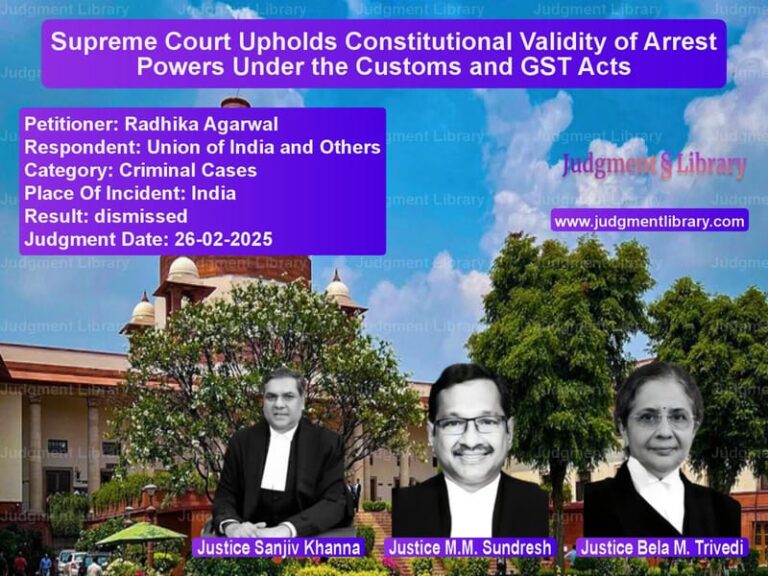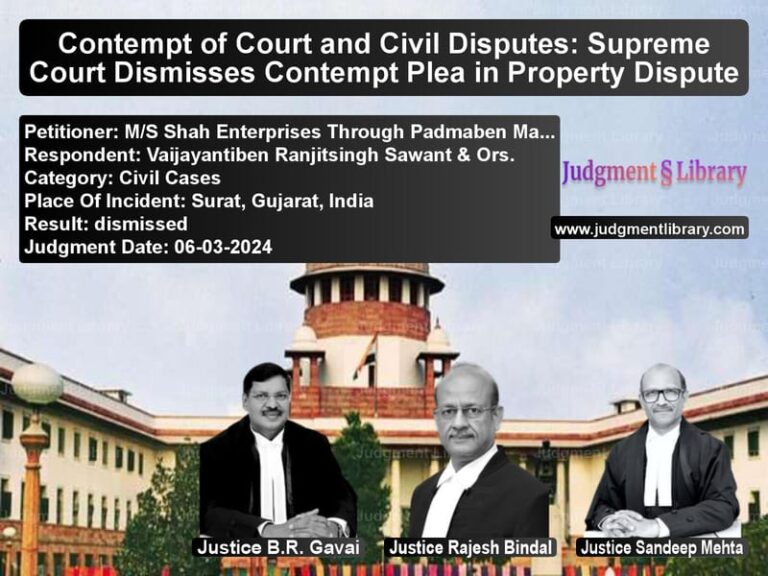Validity of Investigation under Immoral Traffic Prevention Act: A Case Analysis
This case concerns the appeal filed by R.A.H. Siguran (the appellant) against Shankare Gowda and another (the respondents), which arises from the quashing of criminal proceedings by the High Court. The issue revolves around whether the investigation into the charges of procuring minors for prostitution, conducted by an officer who was not authorized under the Immoral Traffic (Prevention) Act, 1956 (ITPA), vitiated the entire process. The appellant challenged the High Court’s decision to quash the proceedings, arguing that despite the alleged irregularity in the investigation, the trial should not be quashed unless there was a miscarriage of justice.
Background: The case dates back to a raid on the night of 27th August 2010, where the appellant was found to be involved in procuring minor girls for prostitution. The case was investigated by a police officer who was not authorized under the provisions of the ITPA. The charge-sheet was filed under multiple sections of the ITPA, and the trial commenced in the Sessions Court. However, during the trial, Respondent No. 1 (Shankare Gowda) filed an application under Section 482 of the Criminal Procedure Code before the High Court, arguing that the investigation was conducted by an unauthorized officer, rendering it invalid and the trial vitiated. The High Court agreed, quashing the proceedings against Respondent No. 1, which led the appellant to challenge the High Court’s decision in the Supreme Court.
Petitioner’s Argument: The appellant, R.A.H. Siguran, represented by his counsel, argued that the investigation conducted by an unauthorized officer was not a ground to quash the proceedings. The appellant emphasized that despite the irregularity, the trial should not be nullified unless there was clear prejudice or miscarriage of justice. Citing the judgment in *H.N. Rishbud and Anr. v. State of Delhi* (1955), the appellant pointed out that an investigation’s irregularity does not automatically vitiate the trial if no prejudice is shown. The appellant further argued that even if the investigation was flawed, the evidence collected during the investigation could still be valid, and the trial could proceed.
Respondent’s Argument: The respondents, represented by their counsel, contended that the investigation was conducted by an officer who was not authorized under Section 13 of the ITPA, and thus, it was a fundamental flaw in the investigation process. They referred to the judgment in *Delhi Administration v. Ram Singh* (1962), where the Court held that only a Special Police Officer, authorized under the Act, could conduct an investigation. Respondents further argued that the investigation being conducted by an unqualified officer caused a miscarriage of justice and that the trial proceedings should be quashed as a result of this illegal action.
Court’s Ruling: The Supreme Court, after hearing the arguments, ruled in favor of the appellant. The Court cited the principle from the case of *H.N. Rishbud v. State of Delhi* (1955), where it was held that an invalid investigation does not automatically vitiate the trial unless it results in a miscarriage of justice. The Court emphasized that even though the investigation was not conducted by an authorized officer, the trial proceedings would not be quashed unless the respondents could demonstrate that the irregularity had caused them prejudice or a failure of justice. The Court noted that the trial had already begun and no evidence had been presented showing how the investigation’s irregularity had affected the respondents’ rights. Therefore, the Court allowed the appeal and directed the trial to proceed.
Key Points from the Judgment:
- The Court emphasized that an irregularity in the investigation does not necessarily vitiate the trial proceedings unless a miscarriage of justice is proven.
- The Court followed the reasoning in the *H.N. Rishbud* case, stating that even if the investigation was conducted by an unauthorized officer, the trial could proceed unless the accused proves substantial prejudice or injustice.
- The judgment clarifies that procedural irregularities in the investigation must lead to demonstrable harm for them to affect the trial’s outcome.
- The appeal was allowed, and the proceedings were reinstated in the trial court.
- The judgment reaffirms that courts should exercise caution before quashing proceedings based on technicalities in the investigation process.
Conclusion: This case underscores the importance of maintaining the integrity of the judicial process, even when there are irregularities in the investigation phase. The Court’s ruling reiterates that procedural errors alone, such as an investigation conducted by an unauthorized officer, do not automatically invalidate the entire trial process unless it can be shown that the error caused a miscarriage of justice. This judgment serves as a reminder that the focus should be on the substantive fairness of the trial and the evidence presented, rather than on technical violations that do not result in harm to the accused.
Don’t miss out on the full details! Download the complete judgment in PDF format below and gain valuable insights instantly!
Download Judgment: R.A.H. Siguran vs Shankare Gowda @ Sha Supreme Court of India Judgment Dated 18-08-2017.pdf
Direct Downlaod Judgment: Direct downlaod this Judgment
See all petitions in Bail and Anticipatory Bail
See all petitions in Cyber Crimes
See all petitions in Money Laundering Cases
See all petitions in Judgment by Adarsh Kumar Goel
See all petitions in Judgment by Uday Umesh Lalit
See all petitions in allowed
See all petitions in supreme court of India judgments August 2017
See all petitions in 2017 judgments
See all posts in Criminal Cases Category
See all allowed petitions in Criminal Cases Category
See all Dismissed petitions in Criminal Cases Category
See all partially allowed petitions in Criminal Cases Category







